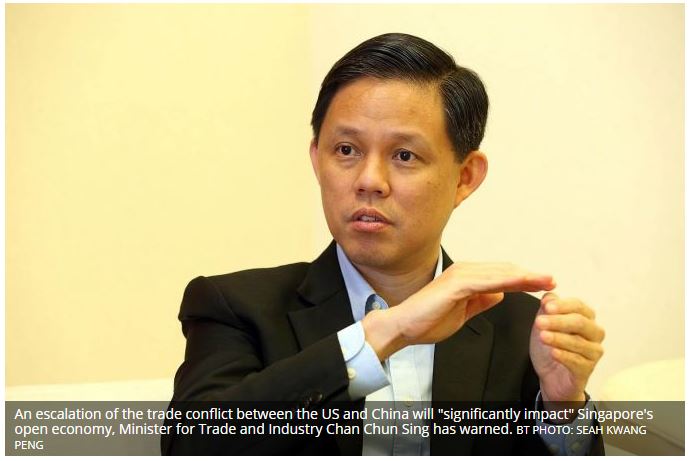Singapore warns of ‘significant’ impact should trade war escalate
AN escalation of the trade conflict between the US and China will “significantly impact” Singapore’s open economy, Minister for Trade and Industry Chan Chun Sing has warned.
Speaking in Parliament on Monday, he said that while the net impact of the current US-China trade tiff on the Singapore economy and its workers is “likely to be modest”, this is provided there is no further escalation in trade tensions.
“Our greatest concern is the impact from an escalation of the trade conflict into a vicious cycle of tit-for-tat measures between major economies.
“Should these measures reach a tipping point that triggers a sharp and sustained fall in global business and consumer confidence, or a tightening of global liquidity conditions, the macro-environment will fundamentally change.”
In such a scenario, Mr Chan said, the impact on global consumption and investment, on top of the disruption to trade flows, will “significantly impact Singapore’s open economy”.
The warning follows reports by several private-sector economists who have flagged downside trade risks to Singapore’s growth since last week.
US tariffs on US$34 billion worth of Chinese goods kicked in last Friday, with China immediately implementing retaliatory tariffs on a similar scale. The sabre-rattling between the world’s two largest economies has continued, and additional tariffs are on the way. Other trade partners of the US affected by the tariffs have threatened counter measures, setting the stage for a global trade war.
Most economists have not downgraded their growth forecasts for Singapore for now, but many believe that the ongoing trade conflict is likely to intensify in the near future.
Already, equity markets have been roiled by volatility, partly brought upon by the trade conflict. Economists noted that this is compounded by concerns of tighter liquidity and pressure on regional currencies, which could dampen investor confidence and business sentiment.
OCBC economist Selena Ling told The Business Times: “My suspicion is that the trade-tariff rhetoric will continue. So far, most of the US economic indicators are still strong, President (Donald) Trump’s approval ratings are high and everything is going in his favour… there’s no incentive for him to back down or de-escalate.”
She added that in the event of a trade war, the markets that would be most affected among the Asean countries are Singapore and Malaysia.
The two countries have the highest participation rates in global value chains, as well as being some of the most open economies in terms of trade.
She is maintaining a 3 per cent forecast for Singapore’s 2018 economic growth, but sees a potential shave of 0.3 percentage point if the trade war escalates.
Similarly, an earlier DBS research note forecast that Singapore’s growth this year will be 3 per cent, with a downside risk of 0.8 percentage point.
DBS’ chief economist Taimur Baig had said: “Given the trade openness and exposure to the supply chain, there will no respite whatsoever for Malaysia, Singapore, South Korea and Taiwan in this tail-risk scenario.”
In Parliament on Monday, Mr Chan laid out how the ongoing trade conflict will impact Singapore.
The first is through direct impact from the tariffs that are applicable to the majority of countries, including Singapore.
The second is through indirect impact arising from disruptions to global-supply chains as a result of the tariffs imposed by the US and China directed at each other.
Third, a trade war could lead to a slowdown in global trade if it spills over to business sentiment and other factors of growth.
The US tariffs directly applicable to Singapore affect a relatively small set of products, which include solar cells and modules, washing machines, steel and aluminium.
Singapore’s exports of these products to the US account for about 0.1 per cent of Singapore’s total domestic exports to the world.
Mr Chan said: “While this is relatively modest, specific Singapore-based companies in the general manufacturing and electronics sectors that export such products to the US will become less competitive compared to manufacturers in the US when the tariffs are added on.”
And while many of the tariffs do not directly affect Singapore, they would have a spillover impact due to Singapore’s role in global supply chains, he said. “For example, Singapore companies that produce immediate goods used as inputs in the production of China’s exports to the US may see softer demand for their goods,” he said.
Bilateral trade between the US and China indirectly contributes to 1.1 per cent of Singapore’s gross domestic product (GDP), and “any sustained disruption is unwelcome for the region”, he said.
Amid these developments, Mr Chan said Singapore’s strong trading networks and diversified sectors will enable companies here to navigate the disruptions and seek out new opportunities and alternative suppliers and demand markets.
Despite growing protectionist instincts around the world and the US’ unilateral measures to address what it deems as unfair trade practices, Singapore is still committed to uphold a “rules-based multilateral trading system” and work towards greater regional integration, he emphasised.
This is the “best way of maximising opportunities” for companies and supporting job creation, he added.
For now, economists continue to cast a watchful eye on the situation as uncertainty mounts, but they maintain that there is no cause for alarm – yet. Nomura economist Brian Tan said: “Trade tension has not reached a point where it’s derailing growth. No one is panicking for now, but the risk is what happens if it gets worse.”
Trade figures for the coming months will be one to watch, he said.
OCBC’s Ms Ling said that the impact of the trade tariffs will start to show up in the third-quarter growth numbers for Singapore. Despite the unpredictability, she is cautiously optimistic: “It’s not all doom and gloom, and we have to wait and see what happens from here. You have the US becoming a bit more protectionist, but for the rest of the world, there is still appetite for free trade.”
Source: https://www.businesstimes.com.sg/government-economy/singapore-warns-of-significant-impact-should-trade-war-escalate


 Thailand
Thailand




